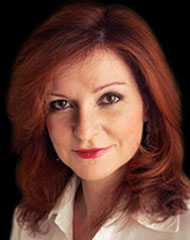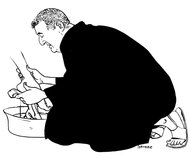By Maureen Dowd
New York Times
June 4, 2011
http://www.nytimes.com/2011/06/05/opinion/05dowd.html?_r=1
 |
| Fred R. Conrad/The New York Times |
He could not get through a story about "a really nasty man" — an Irish priest who sexually abused, physically tortured and emotionally threatened vulnerable boys — without pulling out his handkerchief and wiping his nose.
"He built a swimming pool in his own garden, to which only boys of a certain age, of a certain appearance were allowed into it," Archbishop Diarmuid Martin told me recently. "There were eight other priests in that parish, and not one of them seemed to think there was something strange about it."
Two years after learning the extent of the depraved and Dickensian treatment of children in the care of the Irish Catholic Church — a fifth circle of hell hidden for decades by church and police officials — the Irish are still angry and appalled.
The only church leader who escapes their disgust is the no-nonsense, multilingual Martin. He was sent home to Dublin in 2003 after 27 years in the Vatican bureaucracy and diplomatic corps and found the Irish church in crisis, reeling from a cover-up that spanned the tenures of four past Dublin archbishops.
I went to see him at his office in Drumcondra in north Dublin because he is that rarest of things in the church's tragedy: a moral voice.
In February, Martin held an unprecedented "Liturgy of Lament and Repentance" at a Dublin cathedral, where he asked forgiveness from God and victims of abuse and praised the courage of those who had come forward.
Wearing a simple black cassock, he helped wash the feet of eight victims and conceded that the church "will always bear this wound within it."
The frustrated Martin has criticized the Vatican's glacial pace on reform and chided the church: "Denial will not generate confidence."
He has mourned the lack of faith among young people in Ireland, where fewer than one in five Catholics go to Mass in Dublin on Sunday. (A victims' support group is called One in Four, asserting that's how many Irish have been affected by the sexual abuse scandal.)
In return for doing the right thing, he has been ostracized by fellow bishops in Ireland and snubbed by the Holy See.
Showing again that it prefers denial to remorse, the Vatican undermined Martin's call for accountability. In 2009, after the Irish government's 700-page Murphy report on sexual abuse came out, Pope Benedict XVI refused to accept the resignations of two Irish bishops who presided over dioceses where abuse cases were mishandled.
The following year, when Martin expected to be named cardinal, the pope passed him over.
"Martin is standing alone against the tide right now, but he's on the right side of history," said Jason Berry, who has written two books on the church scandal. "I think he is probably the single best hope for the church within the hierarchy."
Yet Martin, famous protector of victims, is an outlier of the club, while Cardinal Bernard Law, notorious protector of pedophiles, has a cushy Vatican sanctuary. And Cardinal Angelo Sodano, who was in league with the notorious abuser of seminarians and inseminator of women, Father Marcial Maciel Degollado, is the dean of the College of Cardinals in Rome.
Garry O'Sullivan, the managing editor of The Irish Catholic in Dublin, told me that Martin "has had a prophetic role in the church."
"And all the prophets were stoned or murdered or ignored," he said. "The big question is, why would the Vatican be indifferent to a guy who's so brilliant at identifying with the victims? They should put him in charge of a protection office in the Vatican, a global watchdog against sexual abuse."
Surrounded by many renditions of Madonna and Child in his elegant office, Martin, the 66-year-old "Lone Ranger," as he's called, is worried.
"The danger now is to think, well, that's in the past and we can sit back and relax and say it can't happen again," he said. "It can happen again."
 |
He hopes the culture has changed: "I think parents are much more sensitive than they were. Children themselves are more aware."
And he is more aware. "For me, any candidates for any ministry must be rounded personalities," he said, "and I've become much more demanding about the human qualities of those training for the priesthood."
The pedophiles, he said, "have an ability to take the young children into their grips and make it impossible for them to talk. They look for the vulnerable and make them worse. You see that a lot of these men were driven not by faith but by hormones.
"One of the things that annoys me is when I see a priest get convicted, the newspapers try to get the most devilish photographs of them. The trouble is that child sexual abusers don't look like devils. They look like charmers. If pedophiles had horns on their noses, no one would go near them."
In a church where officials still put more energy into protecting their arcane prerogatives than protecting children, Martin has become a hero merely by stating the obvious.
"In the case of serial pedophiles, what should have happened from the very beginning, people should have said, look, stop, these people are real dangers," he said. "They have to be brought out, they have to be prosecuted and so on."
I asked him how he felt when he read the Murphy report.
"I dedicated Friday afternoon till Sunday, and I can remember on Sunday, I just threw the whole thing on the ground," he recalled. "I just couldn't go any farther. You just couldn't believe that these things had happened. For every child that was abused, how many lives were ruined? We don't know how many people have committed suicide as a result of what happened."
HE noted with mystification that the Murphy report quoted one preying priest telling a bishop that he "wouldn't be doing this if it wasn't a working-class parish. As though, somehow or other, working-class people are more robust."
After hearing the story of a man who was raped as an 8-year-old, Archbishop Martin went to see a class of 8-year-olds, just to get a sense of it.
"I mean, the idea of raping an 8-year-old boy is so alien to me. It's hard to believe it's actually possible," he said, shaking his head.
He has had wrenching sessions with many victims. "One lady, I'll always remember her, she said: 'I said to my son, go down and cut the priest's lawn. He might give you a shilling.' She said, 'I handed my child over to him.' She lives with that guilt for the rest of her life. And the last time I saw her, she was cleaning the church."
Another man who had been abused asked how many victims of the predatory priest had already come forward. "He was something like number 19 on the list," Martin said.
I asked why he decided to wash the feet of victims. He said the service was planned by victims with help from his staff. Three times, survivors of abuse interrupted to extemporaneously air their grievances, and the archbishop welcomed it. "It brought a real sense of reality," he said.
Why did the church victimize victims by treating crimes as mere sins?
"I imagine that in the early stages, this was looked on as people looking for money," he said. "Here, only a small percentage who come forward to us are looking for compensation. Maybe there was some feeling, this was a plot to attack the church. If that was the case, we gave them the plot on a silver platter and said, 'Please come after us.' "
When he was growing up, his mother always told him "go serve your Mass but don't hang around with the priest."
Was he ever abused?
"One day when I was waiting on my mother," he recalled, "I must have been about 12, this dirty old man came up and said the most horrendous things to me in the public street, and he had me sort of pinned against the wall and I could do very little about it. I was getting very upset, and I saw a policeman coming, and I called the policeman and the man ran away."
In his brusque way, he rejects the appellation of hero.
"Nobody could have read what I have read and not did what I did," he said as he walked me out into the windy spring day. "If I didn't react to the stories I heard, there would be something wrong."
Any original material on these pages is copyright © BishopAccountability.org 2004. Reproduce freely with attribution.